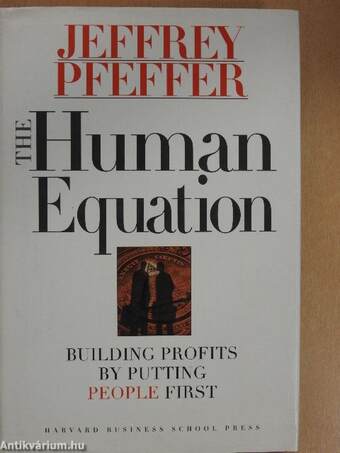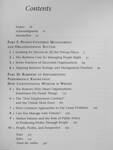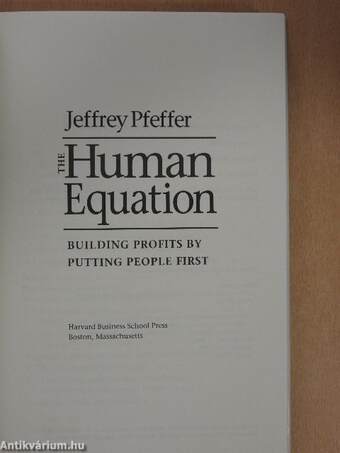1.067.081
kiadvánnyal nyújtjuk Magyarország legnagyobb antikvár könyv-kínálatát

VISSZA
A TETEJÉRE
JAVASLATOKÉszre-
vételek
The Human Equation
Building Profits by Putting People First
| Kiadó: | Harvard Business School Press |
|---|---|
| Kiadás helye: | Boston |
| Kiadás éve: | |
| Kötés típusa: | Ragasztott kemény kötés |
| Oldalszám: | 346 oldal |
| Sorozatcím: | |
| Kötetszám: | |
| Nyelv: | Angol |
| Méret: | 24 cm x 17 cm |
| ISBN: | 0-87584-841-9 |
naponta értesítjük a beérkező friss
kiadványokról
naponta értesítjük a beérkező friss
kiadványokról
Fülszöveg
There's a disturbing disconnect
in organizational management. On the
one hand, research, experience, and
common sense all increasingly point to a
direct relationship between a company's
financial success and its commitment to
management practices that treat people as
assets. Yet, even in the face of this mounting
evidence, trends in management practice are
actually moving away from these very prin-
ciples. Why is common sense so remarkably
uncommon when it comes to managing peo-
ple? Why do organizations habitually over-
look readily available opportunities to boost
their financial performance?
In this critical examination of the people
management practices prevalent in many of
today's companies, bestselling author and
management expert Jeffrey Pfeffer argues that
much of the conventional wisdom is actually
tremendously destructive to both employ-
ment relationships and organizational perfor-
mance. Pfeffer marshals impressive evidence,
analysis, and vivid... Tovább
Fülszöveg
There's a disturbing disconnect
in organizational management. On the
one hand, research, experience, and
common sense all increasingly point to a
direct relationship between a company's
financial success and its commitment to
management practices that treat people as
assets. Yet, even in the face of this mounting
evidence, trends in management practice are
actually moving away from these very prin-
ciples. Why is common sense so remarkably
uncommon when it comes to managing peo-
ple? Why do organizations habitually over-
look readily available opportunities to boost
their financial performance?
In this critical examination of the people
management practices prevalent in many of
today's companies, bestselling author and
management expert Jeffrey Pfeffer argues that
much of the conventional wisdom is actually
tremendously destructive to both employ-
ment relationships and organizational perfor-
mance. Pfeffer marshals impressive evidence,
analysis, and vivid real-life examples to prove
a direct, unassailable correlation between
good people management and profits.
Drawing on his research into companies
ranging from the Men's Wearhouse, Service-
Master, Volkswagen, and AES to Apple Com-
puter, United Airlines, and banks in the U.S.
and Germany, Pfeffer builds an irrefutable
business case that the culture and capabili-
ties of an organization—derived from the way
it manages its people —are the real and
enduring sources of competitive advantage.
According to The Human Equation, this suc-
cess comes from taking seriously the often
heard yet frequently ignored adage that "peo-
ple are our most important asset."
Pfeffer explores why even smart organiza-
tions fall into harmful patterns when manag-
ing people, and offers specific, actionable
steps that can be taken to achieve improved
performance. With remarkable clarity and
directness, Pfeffer:
• Identifies troubling trends in
compensation
• Suggests alternatives to downsizing
• Examines the economic effects of labor
unions, giving special consideration to
ael iievin g positive union -1nanagement
relations
•Questions the assumption that market
forces alone are sufficient
•Explores positive, effective roles for pub-
lic policy
The right book at the right time, The
Human Equation provides much needed guid-
ance for managing people more profitably,
more sensibly, and more humanely.
JEFFREY PFEFFER is the Thomas
D. Dee Professor of Organizational Behavior
at the Stanford Graduate School of Business.
He is the author of eight books, including
Managing with Power and Competitive Advan-
tage through People, both from HBS Press.
He has consulted extensively for companies,
universities, and industry associations in the
U.S. as well as in twenty other countries.
Jacket design by 1 like Fender
HARVARD BUSINESS SCHOOL PRESS
BOSTON, M V 02163
www.hbsp.harvard.edu Vissza
Témakörök
- Közgazdaságtan > Menedzserképzés, marketing
- Közgazdaságtan > Egyéb
- Idegennyelv > Idegennyelvű könyvek > Angol > Egyéb
- Idegennyelv > Idegennyelvű könyvek > Angol > Közgazdaságtan > Menedzserképzés, marketing
- Közgazdaságtan > Tankönyvek, jegyzetek, szöveggyűjtemények > Felsőoktatási
- Idegennyelv > Idegennyelvű könyvek > Angol > Közgazdaságtan > Egyéb
- Tankönyvek, jegyzetek, szöveggyűjtemények > Közgazdaságtudomány > Felsőoktatási












